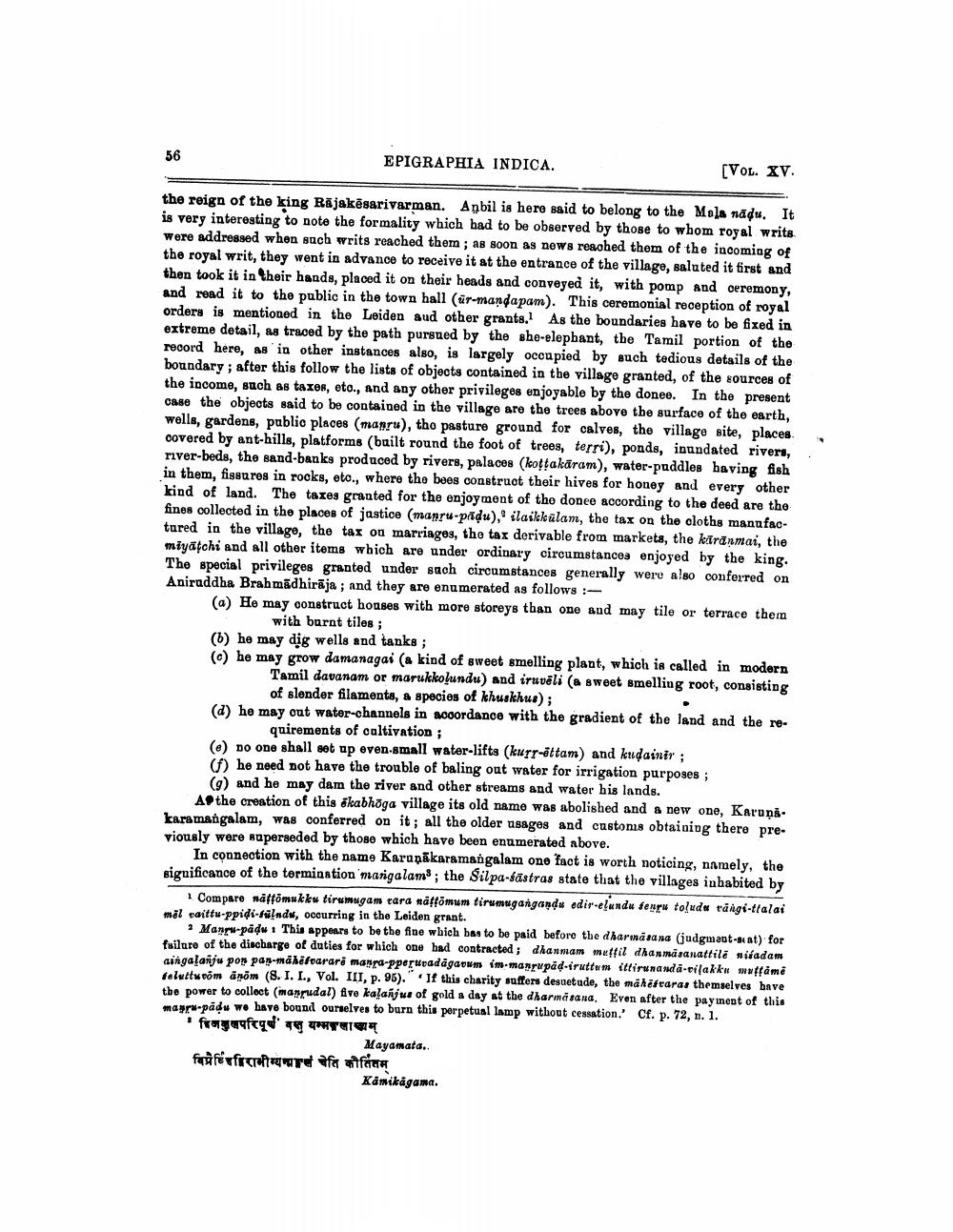________________
56
EPIGRAPHIA INDICA.
(VOL. XV.
the reign of the king Rājakēsarivarman. Anbil is here said to belong to the Mola nādu. It is very interesting to note the formality which had to be observed by those to whom royal writs were addressed when sach writs reached them; as soon as news reached them of the incoming of the royal writ, they went in advance to receive it at the entrance of the village, saluted it first and then took it in their hands, placed it on their heads and conveyed it, with pomp and ceremony, and read it to the public in the town hall (ür-mandapam). This ceremonial reception of royal orders is mentioned in the Leiden aud other grants. As the boundaries have to be fixed in extreme detail, as traced by the path pursued by the she-elephant, the Tamil portion of the record here, as in other instances also, is largely occupied by such tedious details of the boundary; after this follow the lists of objects contained in the village granted, of the sources of the income, such as taxes, etc., and any other privileges enjoyable by the donee. In the present case the objects said to be contained in the village are the trees above the surface of the earth, wells, gardens, public places (manru), the pasture ground for calves, the village site, places covered by ant-hills, platforms (built round the foot of trees, terri), ponds, inundated rivers, river-beds, the sand-banks produced by rivers, palaces (kottakāram), water-puddles having fish in them, fissures in rocks, etc., where the bees construct their hives for honey and every other kind of land. The taxes granted for the enjoyment of the donee according to the deed are the fines collected in the places of justice (manru-padu), ilaikkülam, the tax on the cloths manufactured in the village, the tax on marriages, the tax derivable from markets, the karanmai, the miyāțchi and all other items which are under ordinary circumstances enjoyed by the king. The special privileges granted under sach circumstances generally were also conferred on Aniruddha Brahmādhirāja ; and they are enumerated as follows :(a) Ho may oonstruct houses with more storeys than one and may tile or terrace them
with burnt tiles ; (6) he may dig wells and tanks ; (©) ho may grow damanagai (a kind of sweet smelling plant, which is called in modern
Tamil davanam or marukkolundu) and iruvēli (a sweet smelling root, consisting
of slender filaments, a species of khuskhus); (d) he may out water-channels in woordance with the gradient of the land and the re
quirements of cultivation ; (6) Do one shall set up even.small water-lifts (kurr-éttam) and kudainir ; (f) he need not have the trouble of baling out water for irrigation purposes ;
(9) and he may dam the river and other streams and water his lands.
A the creation of this ēkabhoga village its old name was abolished and a new one, Karoņš. karamangalam, was conferred on it; all the older usages and customs obtaining there previously were superseded by those which have been enumerated above.
In connection with the name Karunākaramangalam one fact is worth noticing, namely, the significance of the termination marigalams; the Silpa-tāstras state that the villages inhabited by
Compare nättömukku tirumugam rara rätfömum tirumugangandu edir-elundu fengu toluda rangi-ttalai mäl vaittu-ppidi-fülndw, occurring in the Leiden grant.
Manru-padu 1 This appears to be the fine wbich bas to be paid before the dharmasana (judgmant-stat) for failure of the discharge of duties for which one had contracted; dhanman muffil dharmasanattilē miradam aingaļaju pop pagmalifrarari mand-pperupadaganum im-marrvpad-irutum illirunanda-vilakku wwwffame Taluttu vôm apom (8. L. I., Vol. III, p. 95). If this charity suffers desuetude, the mahaltaras themselves have tbe power to collect (marrudal) Ave kalanjut of gold a day at the dharma sana. Even after the payment of this mayru-padu we have bound ourselves to burn this perpetual lamp without cessation.' Cf. p. 72, n. 1. 'रिणकुलपरिपूर्ण वस्तु यम्मालाणाम्।
Mayamata. विप्रेधिरामीग्यमासं चेति कौर्तितम्
Kamikagana.




